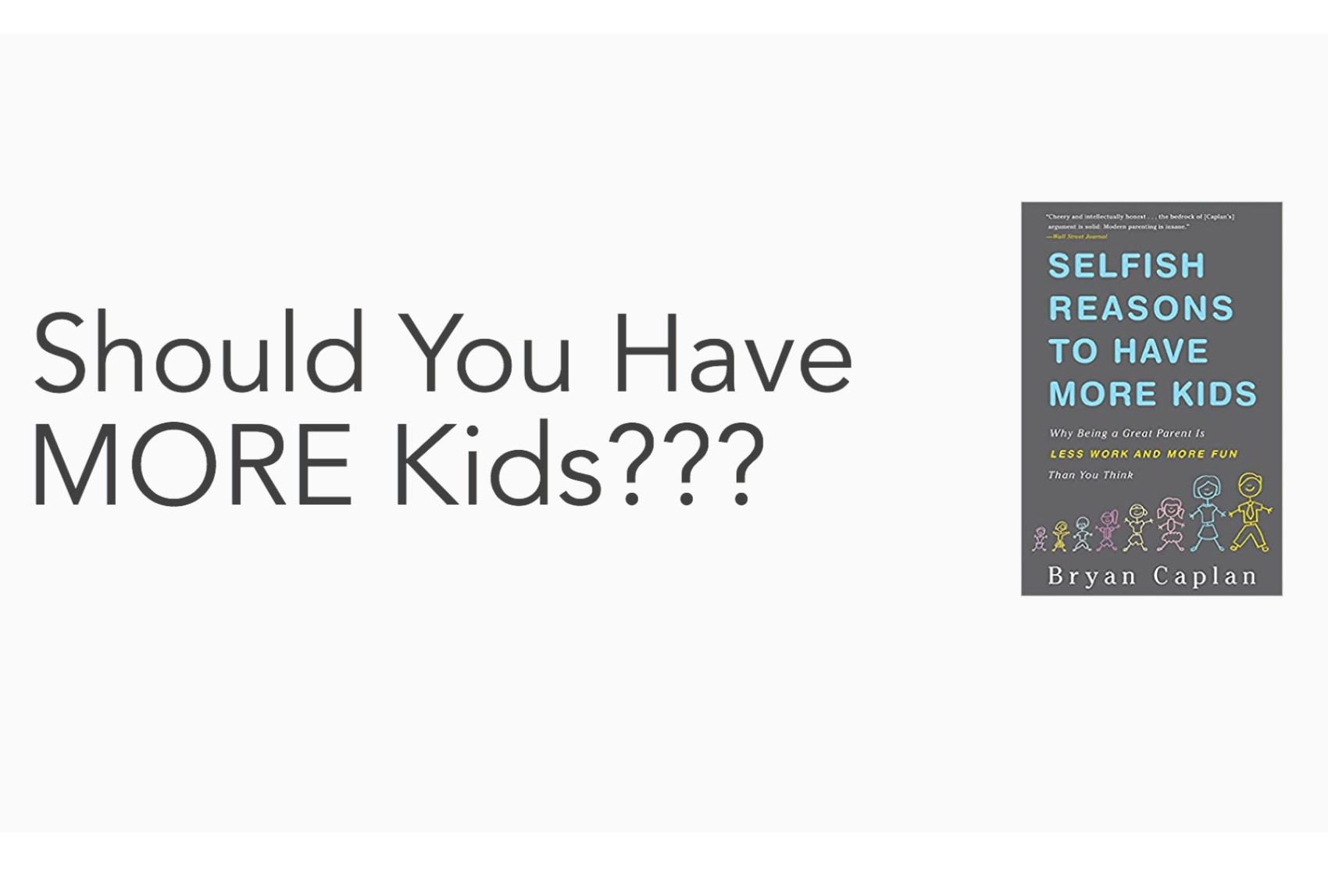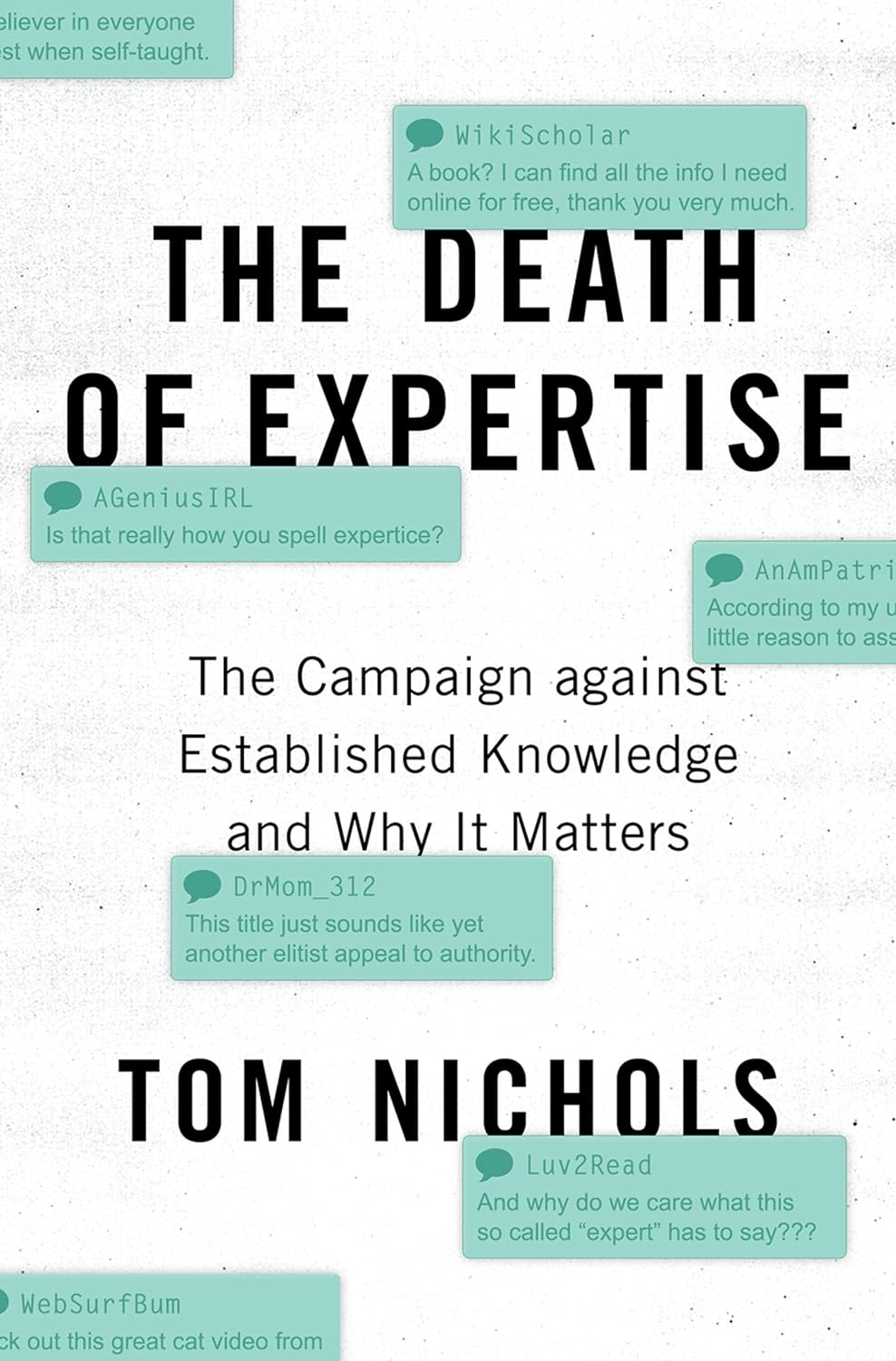After reading The Case Against Education I saw another intriguing title from Bryan Caplan about having more kids for selfish reasons. Today we'll look at that book, called Selfish Reasons to Have More Kids.
The purpose is directly in the title for the curious. Caplan is going to argue that if you wanted no kids, 1 may be the right number to have. If you wanted 4 kids, maybe 5 or 6 is the proper number.
The whole book is to show you that you're making the judgement about how much work kids take and the rewards you get from kids wrong. You're giving far too much weight, and making way more work for yourself, to how much work kids take and barely any thought to the long-term benefits that come with kids.
How Did Caplan do His Research
The core to Caplan's conclusions is twin studies, specifically different ones where twins were raised in different households. In this way, he can look at how similar genes thrive given different parenting situations. It's a common way to examine the nature vs nurture debate.
The Nature vs Nurture debate can be summarized by thinking about which is more important. The environment around you (nurture) or your in-born nature/genes. The debate is always which one matters more to how you are today.
We Put Too Much Effort Into Kids Succeeding
Stay-at-home moms used to just tell their kids to go outside and play. Now, moms and dads tag along with their kids as supervisors or servants1
Mom's spend more time watching and interacting with their kids today than they did when they were staying at home2. Yup, mom juggles work and family and does more of each than she ever has.
There are a few reasons for this. One of the big ones is that, as we saw in Free Range Kids, an unwatched child is a tragedy waiting to happen. The assumption is that if you take your eyes off your child for more than a few seconds, they'll get abducted and die in some horrible way. My townhouse complex even has something to say about how I supervise my children outside in our driveway. In the garage is okay, even if I'm at the back working on stuff. Sitting in the window reading (physically closer to them) is not okay despite the fact that I can see them from the window and can't from the garage.
We have got to this point of thinking that children are abductions waiting to happen because news is not about reality, it's about rare "zebratic" examples of life. Death of Expertise talked about how this transition has harmed our outlook on the reality of life.
Most times in North America you see something large galloping around and you realize it's a horse. Very rarely is that thing a zebra...hence zebratic.
The truth is that kids have never been safer. At no point in modern history have kids been abducted in droves. The most dangerous person to them every day is you when you drive them to school. They're at far more risk from this activity daily than any other thing they may do in their childhood.
In part we police each other to watch our kids more because we are running an education race, which is mostly about signalling. Kids These Days talked about running this race further and further so that we're "on top" of those around us. Caplan's other book demonstrated that after the first year or two of high school there is little benefit to school outside of showing that you'll work hard and fit in with the norms of society so that someone will hire you based on those signals one day. iGen also circled this topic of safety when it talked about the perceived cost of any misstep by kids, so they take way fewer risks than they used to because they fear "destroying their future".
What Turns a Kid Into a Good Adult?
If it's true that our activities do pretty much nothing to help our kids succeed, what does matter? The only thing that matters is nature, as in the genes we give our kids. If you like to read, then it's likely your child will like to read, but not because you read to them nightly. They'll enjoy the activity because they have similar genes to you and those genes dispose them to enjoy that type of activity.
This idea is the main one in the book. Stop worrying yourself silly and running yourself ragged to give your kids a leg up. It doesn't matter much as long as you give them the basics and are a decent person. They'll turn out fine.
What does Nurture Do Then?
If you're with me thus far then you're going to be asking, what does nurture do then? First, it gives kids fond memories of growing up. They'll remember the nightly reading and family camping trips fondly. It just won't affect how much they earn or how happy they are.
In girls, nurture can help delay sexual activity3. Some research shows that delaying sexual activity in girls until 18 - 20 has benefits long term. They're less likely to report depressive symptoms. They're more likely to stay married instead of getting divorced (and divorce has a bunch of bearing on depression). Clearly, if they're not having sex, they're not getting pregnant and trying to juggle motherhood and school. They also can't get STI's.
What nurture doesn't do with female sexuality is change how they'll behave as adults.
One interesting note on nature vs nurture is that having a criminal parent doesn't mean you'll be a criminal4. There is no such thing as "traitor's blood". Caplan doesn't say this, but I find it interesting to think that "criminals" are people that don't conform to the norms of society. If this is in their nature, it's interesting to think that this "bad" nature doesn't pass down to their children.
One big caveat to Caplan's nature vs nurture argument is that he's assuming a reasonable standard of living in a developed nation5. If you adopt a child out of a place where they won't be fed properly or will suffer abuse, or some other truly horrible thing, then nurture does have a bearing. If you adopt a kid from Sweden and bring them to Canada...there is no difference and nurture won't matter.
We're all Excellent 1950's Parents
With modern resources, almost anyone can be a good parent by the standards of 1950. But we don’t want to be good by the standards of the Fifties; we want to be good by the standards of today. During the last half-century, we picked up a list of self-imposed rules—of “stuff we gotta do.” These rules are awfully strict.6
The big issue with parenting now is that we make it way too much work thinking that we're going to do anything to help our kids be great adults. Instead, we should be telling them to go away and play or entertain themselves. Caplan highlighted an interesting survey of kids that said, they don't want more time with us, they want parents to be less stressed when they do have time for kids7.
That means, let your kids go outside without you hovering. If you have little kids as I do, then go to the park and then sit and ignore them. When I'm reading on a bench in the park and my kids run up to me with some issue my first question is always "are you bleeding". The answer is almost always "no" and then I tell them to go play. I also sit as far away as possible and then keep reading.
Contrast this with the dad I was talking to last week who followed around his 9 and 11-year-old girls in the playground to monitor them. I had a much better time enjoying the quiet in the middle of the park and occasionally looking up to see if my kids (all of them younger) weren't bleeding.
If you find yourself unable to let your kids out of sight, Caplan recommends exposure therapy8. Let them get the mail without you watching. Send them across the street to the park without you while you finish the dishes. Those 10 minutes alone will be the best minutes of their lives.
As you do this, remember that violent crimes almost never happen to kids9. There hasn't been a time in the last 200 years that kids have been safer than they are today. The biggest thing you're doing when you follow your kids everywhere is signalling to other parents that you're a "good" parent. You're making yourself "feel good" but in truth, you're adding tons of work to your own life that has no tangible benefit.
In fact, the most dangerous thing your kids do every week is to get in the car with you. You're the threat to your kids in that metal contraption. Nothing else is a threat in any way at all.
Erroneous Assumptions from Caplan?
One conflict Caplan has in his arguments comes with the ability for parents to hire childcare help. He says that 15% of Americans have a 6-figure income10. Then he says that we're "poor" because we tie our money up in huge houses that former generations didn't bother with11.
Which one is it? Do we have the disposable income to spend on childcare or are we house and car poor?
Further, if 15% of Americans have 6-figure or greater incomes, then that means 85% have lower than 6-figure incomes. What do the people with even less do for childcare because they're still living in houses far bigger than previous generations? They're devoting a larger percentage of their income to cars.
I'd tend to fall towards the house and car poor argument. I'd also believe that we tie up lots of money in trying to give our kids some nurture advantage with activities like soccer, basketball, theatre...all of which have no measurable benefit on long term outcomes.
Should You Read Selfish Reasons to Have More Kids by Bryan Caplan?
If you imagine that your children’s future is in your hands, and single-mindedly do “whatever is best for your kids,” then one child is more than enough to ruin your life. But once you accept that your children’s future is largely up to them and remember that your happiness counts, too, an unplanned set of twins is no big deal.12
I found Caplan's basic argument, that we spend way too much time worrying about kids and what will happen to them compelling. It lined up with my thinking and much of my reading. His arguments for devaluing how much we'll enjoy grand-kids were also compelling.
That means I'm going to say, yes read the book. It may let you rest easier when you think about how much effort you need to put into your kids so that they turn into productive adults. I'd even say that it shows monitoring them all the time is counter-productive to them flourishing.
Purchase Selfish Reasons to Have More Kids: Independent Bookstore | Amazon

